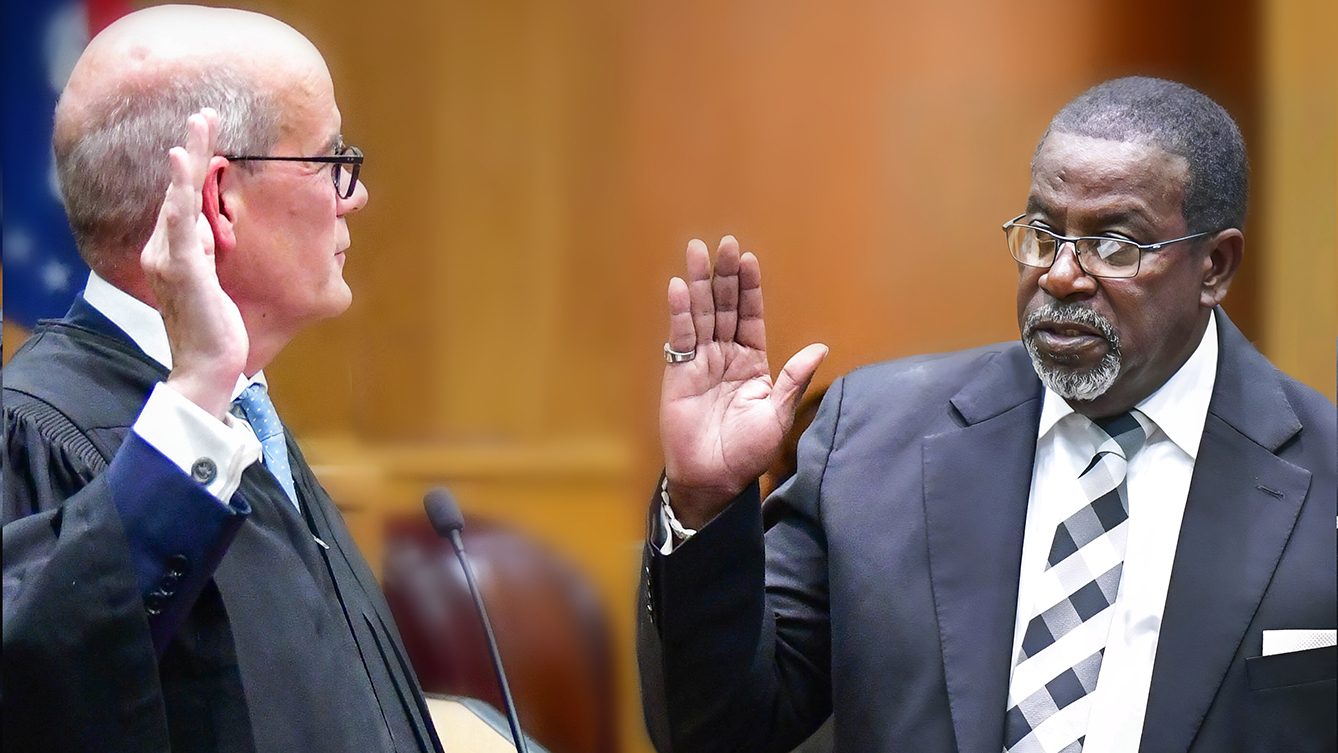Tackling prisons, mental health civil commitments
Published 8:24 am Friday, May 31, 2024

- Rep. Becky Currie reviews some notes before speaking at the Brookhaven-Lincoln County Chamber of Commerce legislative breakfast. (Hunter Cloud | The Daily Leader)
BROOKHAVEN — Lincoln County Rep. Becky Currie has a different perspective on the topics of mental health and the Mississippi Department of Corrections. She is a nurse and serves as Chairman of the Corrections House Committee.
Currie joined Rep. Vince Mangold and Sen. Jason Barrett for a legislative breakfast in May where they went over the past legislative session. She said then the Corrections committee was the last committee she expected to serve as chairman. The appointment has since led to her taking an interest in Corrections.
“The speaker asked me to get down into the weeds in corrections because we are being looked at by the Department of Justice. It will cost us a lot of money if we get taken over,” Currie said at the legislative breakfast.
The Department of Justice found conditions at three Mississippi prisons violated the constitution in a report published in February 2024. One nearby prison was in Pearl and the other was a prison in Woodville.
She gave additional insight into her work with corrections Thursday afternoon.
“I’m working on fixing the healthcare problems we have had. Mississippi has a budget of $111 million for healthcare for 19,000 inmates. We want to look at how we can lower it,” Currie said. “My intent is to find out why our health care costs are so high and do something about it. We have a contract with a national company for health care but I’ve noticed hospitals are usually near our prisons. Maybe we need to look to our local hospitals and integrate them into the system.”
Currie said she is taking on the responsibility of chairman as her mission for the summer. She is currently setting up days to visit the prisons and see them for herself.
Burl Cain, Mississippi Department of Corrections Commissioner, gave Currie a list of the programs they are incorporating into the prisons. Currie said she was surprised by all of the programs. She did not have much of an interest in corrections before being appointed the chairman of the house committee.
One issue she sees is inmates not being rehabilitated for society. There are obstacles to employment following incarceration. MDOC’s current programs may be a step in the right direction to lower recidivism. Mississippi’s current rate of recidivism is 77 percent.
Currie said the MDOC has a barbers school, CDL classes, college programs among others.
“For far too long we just incarcerated people and they came out worse than they were,” Currie said. “Right now, MDOT has a program working on getting people who want to come out of prison and cut grass. They can work with local sheriff’s departments to pick up litter and cut grass. MDOT allows them to keep the job when they get out. I’m very interested in how we can make recidivism better.”
Church, workforce programs and educational opportunities are steps Currie identifies as helpful. MDOC offers all of them right now. Her tour of Mississippi prisons should occupy most of her summer.
“I’ve been impressed with how much they are doing. As a citizen who never looked into it, I’ve been surprised with what they are doing,” Currie said. “In four years, I want to be able to say I lowered the recidivism rate and we have made productive citizens. That is my goal.”
Tackling mental health
At the same time topics of mental health services and the occasional imprisonment of patients needing mental health services through the Civil Commitment process. Lincoln County Sheriff Steve Rushing said on average the jail houses one person a week needing mental health treatment through civil commitment.
Mississippi’s civil commitment process can begin when someone, usually a family member, files paperwork through the county chancery’s clerk office alleging that another person is so mentally sick they are a danger to others or themselves. The person is often someone who needs mental health help but will not seek treatment.
Rushing explained if a person gets a mental writ filed on them then the sheriff’s office picks them up. He added depending on when their hearing is, they could spend the night in jail until the hearing before Region 8 or another facility can take them in. Mississippi Department of Mental Health reports the process is typically seven to 10 days although Lincoln County’s process is more streamlined.
“It is to the point where we try to have the hearing on the day of commitment. They have to be seen by two doctors and have a hearing,” Rushing said. “If they are committed, Region 8 will take them in. My goal is to never hold them in jail. If you are sick you go to a hospital, if you are mentally sick you need to go to the hospital. We are getting some of that change and speeding up the timeline.”
Currie said at the legislative breakfast she has worked with mental health bills for 17 years now. One bill did pass this year which could help mental health patients avoid time in jail. House Bill 1640 stipulates civil commitments would only be jailed if they are actively violent and for a maximum of 48 hours. Additionally, before a civil commitment can be filed a person from a local mental health care facility would need to assess the person’s mental condition.
HB1640 will become law on July 1. Rushing is hopeful it will help.
“The whole goal is to get them the help they need,” he said. “Hopefully, this new process will help. Our main goal is that they shouldn’t be in jail if they need help.”
Lincoln County averages about one civil commitment per week. Rushing said some weeks the number of civil commitments is as high as four.
Acting early
A new education funding bill should allocate money for children in need of mental health services and special needs children.
“We have to start when they are younger. When they get older we have a wonderful Region 8 who helps with a program for them to get a job,” Currie said at the legislative breakfast. “It is a shame we don’t talk about them as much as we should. If we put more money into mental health we can make a difference. We also talk about patients who end up being in jail. It is the wrong thing to do. As a nurse, it drives me crazy. Our system is broken but I don’t have the magic bullet. We need to start younger.”
Sen. Jason Barrett, who works in the court system as a lawyer and public defender, said a representative from the Mississippi Department of Mental Health spoke to Servitium about a month ago. He said at the legislative breakfast her report was that the new director was unrolling new services for young adults.
“Under the new leadership they are putting emphasis on rehabilitative services,” Barrett said. “As Republicans, we try to do less government and spend less money but I think we can all agree we need to put more money into mental health. I see more and more defendants who have mental health problems. It is a vicious cycle. Until we can solve that mental health problem, it is a huge issue we are facing. I suspect the entire nation is too.”





